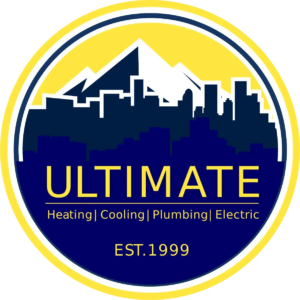One of the most important items for maintaining your home’s comfort is your HVAC system. Air conditioning on a warm day or heat during a Denver winter is essential to relaxing at home. HVAC is also one of the most costly home items, taking a spot in the list of top five most expensive home repairs by Angi. However, the investment is worth it since the right HVAC upgrades will add to your home’s resale value.
Keep reading to learn about the main types of HVAC systems and things to consider when choosing the best heating and cooling system for your Denver Metro home.
Types of Residential HVAC Systems
Split HVAC System
A split HVAC system is one of the most common setups in American residences. A heating or cooling system is “split” when it contains separate indoor and outdoor units for heating and cooling functions. Typically, the outdoor unit is for cooling, while the indoor unit is for heating. A gas furnace with a separate AC unit is an example of a split system.
Packaged HVAC System
Unlike a split system, a packaged HVAC system contains heating and cooling elements in a single unit versus two different indoor and outdoor units. Packaged systems are installed outside, which makes them a great option for homes without basement space for a furnace. Plus, they’re easy to install since there are fewer pieces. They aren’t as customizable as other heating and cooling systems, however, since packaged HVAC systems are all-in-one with heating and cooling capabilities.
Hybrid HVAC System
A hybrid system includes two forms of energy that work together for ultimate energy efficiency. Hybrid heating systems utilize a heat pump unless temperatures drop to a certain point, at which point a furnace (gas, oil, or propane) takes over. The heat pump also provides the cooling element since heat pumps can work in reverse to draw warm air from inside your home to the outdoors during summer.
Ductless HVAC System
If you live in an older home or one that wasn’t originally built with space for ducts, ductless HVAC systems are easy to install and don’t require much space. The indoor air handler is the size of a small suitcase (9” depth x 32” width x 12” height) and only requires a 3”-4” conduit hole connecting to the outdoor compressor. Maintenance is also easy since there are no ducts to monitor and repair.
How to Choose a Residential HVAC System
Energy Efficiency Rating
If you want to make the most of your HVAC system, check its energy efficiency before purchasing. An energy-efficient system will lower your monthly energy bills since it uses less power to operate (without sacrificing comfort). The initial costs may be higher, but you’ll recoup your costs in monthly savings plus own a longer-lasting system.
Some ways to measure HVAC energy efficiency are:
• Seasonal Energy Efficiency Ratio (SEER)
• Heating Seasonal Performance Factor (HSPF)
• Annual Fuel Utilization Efficiency (AFUE)
• Energy Efficiency Ratio (EER)
HVAC Sizing
A powerful, brand-name, energy-efficient HVAC system isn’t all that matters during your selection. The HVAC equipment must be sized appropriately for your home to be a good fit. An HVAC provider should follow the standard Manual JSD Process to determine what amount of power you need without oversizing or under-sizing. An improperly sized system will short cycle, lower its lifespan, result in high energy bills, and not maintain comfort in your home.
Comfort
Noise and brand name are two factors that affect your long-term comfort. Different blower speeds and operating processes result in various noise levels, so be aware of the HVAC unit’s sound rating. Also, don’t be fooled by what seems to be the cheapest option. It may be cheaper but could easily break and require multiple repairs, which leaves you on your own until it’s fixed. Brand-name units are often higher quality, and the manufacturer sets installation standards to ensure they’re correctly placed in your home.
Pricing
Compare apples to apples when price shopping for HVAC equipment. Oftentimes there are rebates or tax credits available for energy-efficient HVAC, which would lower your initial purchase cost. Also, certain HVAC contractors include warranties or repair discounts. It’s important to consider all the value contained in the estimated price, which could be well worth it to save future headaches and stress.
Add Ons
Depending on your needs, there are a few HVAC upgrades that provide extra comfort and convenience. A smart thermostat easily monitors and adjusts temperature based on your work schedule, the weather, and living patterns. If you or a loved one are at risk for respiratory illness, consider a powerful HEPA air quality filter system. There are many health benefits of clean home air quality, especially since most of our time is spent indoors. Protect yourself against Denver’s notoriously dry air too with a built-in humidifier.
Contractor
When investing in an HVAC system, the company installing it is just as important as the equipment itself. They’re responsible for accurate sizing and placement in your home. Without the necessary experience and trained technicians, there’s a risk of losing the energy efficiency and functionality you expected (and paid for). Check out our list of questions to ask an HVAC partner to ensure you get the professionalism and knowledge you deserve.
When you need an experienced partner to answer questions, provide guidance while you’re shopping for a new HVAC system, or install your new HVAC system properly, contact the Ultimate team! We’ve been servicing the Denver Metro area for over two decades and have hundreds of satisfied customers on Google.


